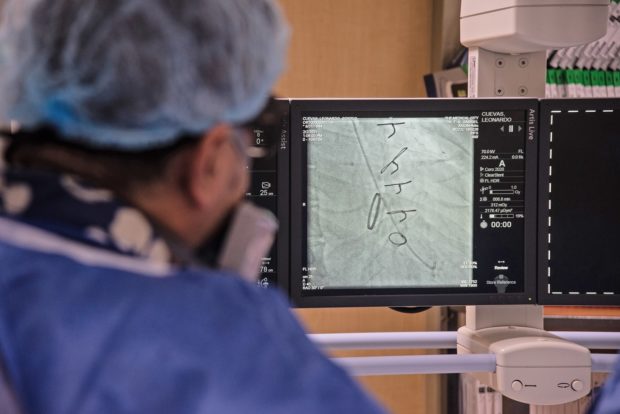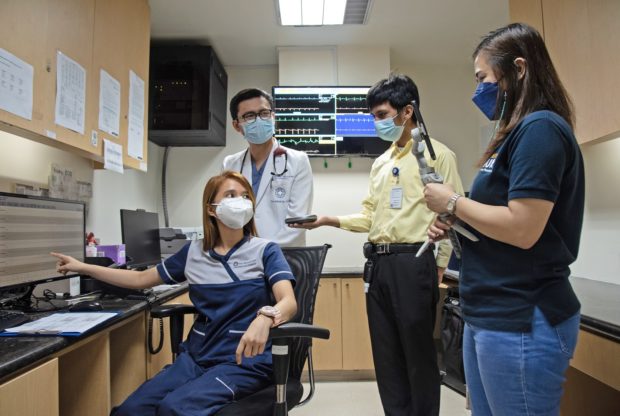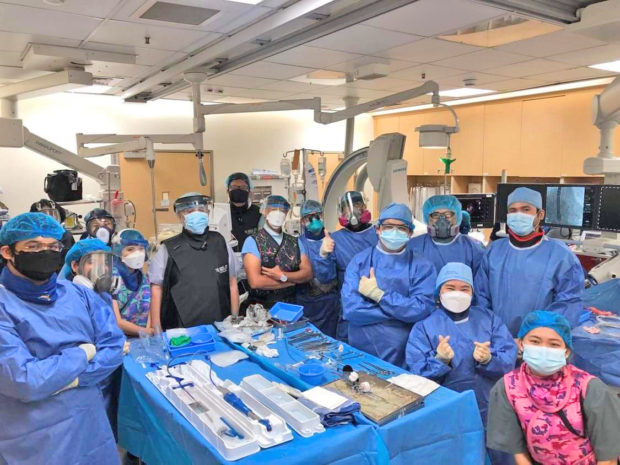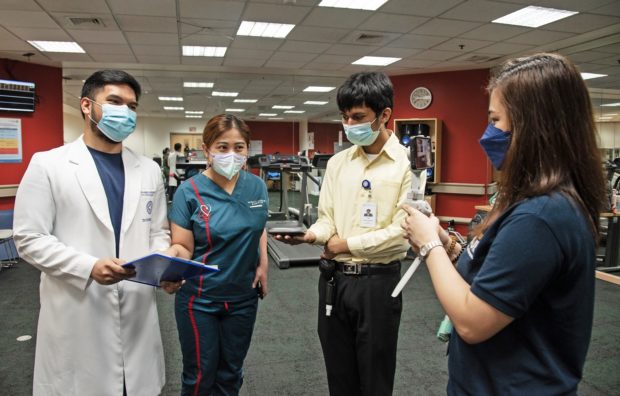The Medical City earns its third international certification for its heart attack program
For someone experiencing a heart attack, every second counts. The faster he or she gets treatment, the more heart muscle can be saved from irreparable damage, and the greater the chance of survival. Providing optimal care to patients in a heart attack emergency means that hospitals should try to target the recommended 60-minute door-to-balloon time, from the moment a patient enters the doors of the emergency room to the time their blocked coronary artery is opened and blood flow is restored. The exacting standards of the Joint Commission International (JCI) help certify AMI clinical care programs that not only consistently meet this timeframe, but are able to maintain superior quality in healthcare, safety, and patient outcomes. JCI is an international accreditation body dedicated to improving healthcare quality and safety around the world.
By pioneering an effective pandemic response as early as April 2020, maintaining a designated pathway and rapid response approach for heart attack cases, and continuing to meet the highest global standards for treating AMI, The Medical City (TMC) Ortigas was able to secure its third consecutive Acute Myocardial Infarction Clinical Care Program certification alongside only 15 other hospitals worldwide (as of November 2021).
“The recertification process this year went very smoothly. The clinical pathways and processes of our AMI Program, from the time the heart attack patient enters the doors of the emergency department to the time he goes home, have been in place since 2012. These have been continuously refined and improved, both through internal processes and through input from JCI certification visits in 2015, 2018, and most recently, last October,” says Dr. Gregorio S. Martinez, Jr., Director of TMC Cardiovascular Institute.
TMC Cardiovascular Institute’s AMI program is the first of its kind in the Philippines to receive certification from JCI and the only one to retain the certification in the last six years.
What sets the program apart from the rest? A unique team approach to heart attack diagnostics, emergency intervention, inpatient recovery, and outpatient rehabilitation. This team approach is what helps TMC make sure that the survival and mortality outcomes year on year are as ideal as possible, matching the quality of care and the quality of life that 1st world healthcare systems can provide their patients.
Dr. Jose Paolo A. Prado, Interventional Cardiologist and Director of the AMI Clinical Care Program shares, “The pandemic did not stop us from treating ACS (Acute Coronary Syndrome). We made changes to hospital protocols under the two-in-one hospital system starting April 2020 to enable us to provide a safe, dedicated, and effective pathway for heart attack patients, even when most of the metropolis was fighting to contain COVID-19 transmissions and many other hospitals struggled with admitting patients. With heart attack being a medical condition with high mortality, the primary aim of our program is to save people from dying using highly specific care and strategies, whether we are in a pandemic or not.”

Immediate intervention by highly competent and experienced Interventional Cardiologists at the Cardiac Catheterization Laboratory plays a critical role in the AMI Program
The two-in-one hospital system refers to TMC’s new normal hospital operation that provides patients with clear-cut processes and division for COVID-19 patients in isolated areas and separate safe access for non-COVID-19 patients who need consults, diagnostic tests, intervention, and management of their diseases. Exclusive pathways have been identified from the moment a patient enters the hospital to his planned appointment or destination.
With the organization of the AMI Program in TMC in 2012, TMC saw a drop in heart attack inpatient mortality from approximately 10% to an average of 5-6%, a figure that is comparable to that seen in first-world countries. With the start of the COVID-19 pandemic in 2020, reports from western countries showed a two to threefold increase in heart attack mortality during the same time due to patient delays in seeking medical attention and limitations in hospital processes. TMC’s mortality rate went up to 10.2% at that time, but has since come down to 6%, with patients becoming more confident in going to the hospital earlier.
In the Philippines, patients who experience symptoms of a heart attack do not have the same access to pre-hospital service as those from other countries do. This means that by the time these patients reach the emergency room, their condition may have worsened or may have become unstable, leaving a much smaller window of time for medical professionals to intervene.
To achieve the best outcomes for these patients, a coordinated effort has to be made in providing the appropriate treatment: from the triage team handling admissions, to the rapid response team restoring blood flow to the heart, to the support staff handling patient during their hospital stay, to multidisciplinary specialists (pulmonologists, nutritionists, physical therapists, to name a few) aiding the patient’s recovery and rehabilitation.
This seamlessness in coordination and patient care cannot solely be attributed to post-pandemic processes – it is the medical professionals themselves who should be thanked for filling the 24/7 demand for hospital staff. Whether they are scheduled to work or are on-call, coming from a nearby apartment or biking all the way to the hospital due to a lack of private transportation options, the rapid response team members make themselves available to ensure that no delays get in the way of providing rapid reperfusion to patients within the 60-minute mark.
Dr. Prado says they continue to track patients who recover and are discharged from the hospital to make sure they follow up with their respective cardiologists: from one week after, 30 days after, 90 days after, to one year after. This is to ensure that they are on the right medications, diet, exercise, and have a healthier, more positive outlook on life.
This commitment to consistent door-to-balloon times, to a holistic approach to heart health, and to positive patient outcomes year on year were what earned TMC its third consecutive AMI Clinical Care certification.
“The recertification of our AMI program through JCI is a momentous achievement and a strong vote of confidence, not just toward the people who are part of the institution, but toward the excellent, quality, compassionate care we continue to give our patients,” says Dr. Prado.
As part of its continued commitment to leadership for cardiac care, TMC Ortigas is now also starting a hub-and-spoke model partnership with other healthcare providers. This extends community-based healthcare programs for time-sensitive conditions, including acute myocardial infarction, with the goal of reducing mortality caused by a heart attack. By integrating hospital processes, TMC Cardiovascular Institute hopes to make heart-attack ready healthcare accessible to more patients who are needing timely intervention.
If you or someone you know is experiencing a heart attack emergency, do not delay your care. Go to your nearest heart-attack ready hospital, or call 8689-8153 to reach The Medical City Emergency Room.
ADVT


